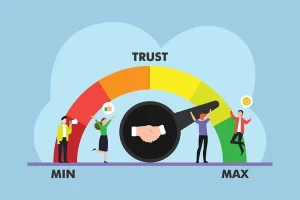Trust that you can trust people again!
Everyone needs a strategy for gauging trust with another. The Trust Account Model is easy to understand, and it works.
Jenny was 18 years old, and my heart ached to see her cry over the loss of her first love. Who doesn’t know the traumatic experience this bestows? It was one year after it had ended, and her father was so worried about her continuing withdrawal and isolation from friends and activities that he asked me to see if I could help. In our first session, Jenny admitted that she didn’t want to come to counseling because she felt she already knew what to do, and that was to not trust people. To her, opening her heart up to anyone, but especially to potential romantic partners, was ground zero for all her past wounds.
“It’s not worth the risk,” she said. “I don’t want to hurt again, and professional help won’t change that.”
No one wants to hurt again, but professional insight can help. All humans get hurt, many of us withdraw, but the day will come when you wake up and feel that tingle once again and know that you are ready to pursue the feeling that only intimate relationships can bring. But to have a romantic relationship that works, or any close relationship, you will have to take a risk, but it can be an intelligent risk. At only 18, Jenny’s plan for moving forward was not the plan I would choose for her. To me, one of the most tragic decisions a person can make is to never allow themselves to love and trust a partner a second time like they did the first time. There must be a way to vet friends and potential mates and end up with the type of trusting relationship we all long to have. The type of trust that allows you to take your walls down, keep them down, and enjoy the fulfillment that solid interpersonal relationships bring.
The most important thing you can do to set yourself up trusting future relationships is to choose friends or lovers who are solid human beings. I’d like to assume everyone knows what that is, but judging by my therapy practice, I see that people either don’t know, or don’t give it much consideration. A solid person is healthy, confident, self-assured, knows who they are, practices self-care and has compassion and empathy for others. They are emotional adults, not children. This does not mean they can’t have a darn good time; it just means that they are a person of agency, and you can count…






 Becky Whetstone is an Arkansas native and has a Ph.D. in Marriage and Family Therapy from St. Mary’s University in San Antonio, Texas. She is a Licensed Marriage and Family Therapist (LMFT) in Texas and Arkansas.
Becky Whetstone is an Arkansas native and has a Ph.D. in Marriage and Family Therapy from St. Mary’s University in San Antonio, Texas. She is a Licensed Marriage and Family Therapist (LMFT) in Texas and Arkansas. 





















































































































